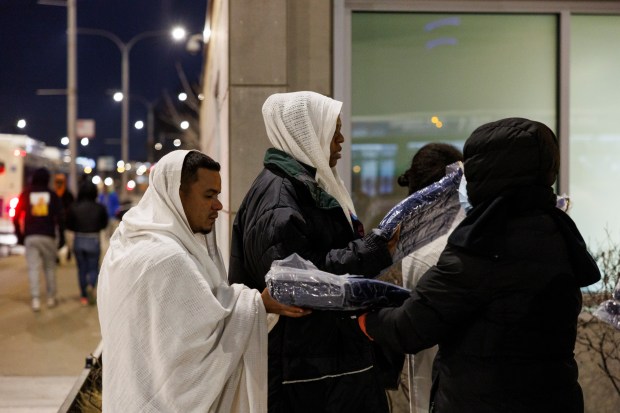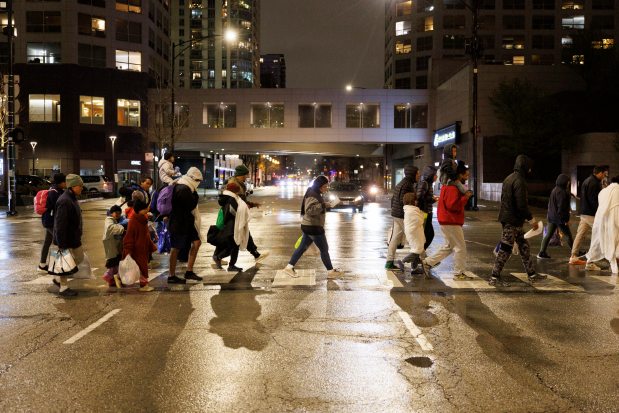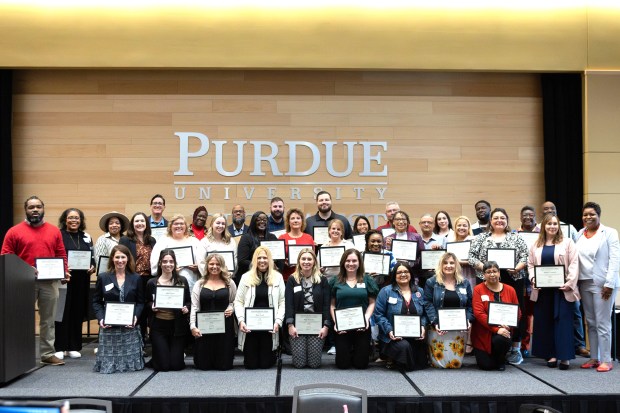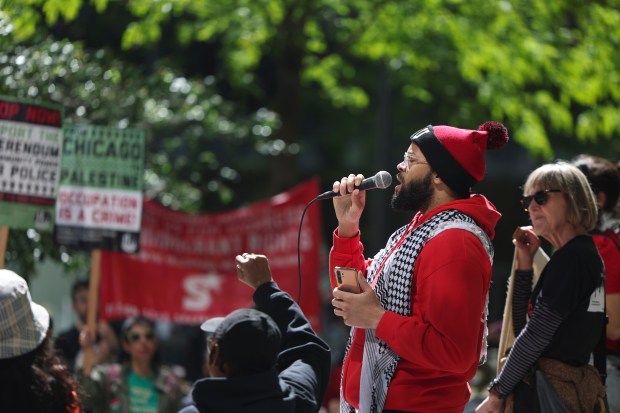In an about-face, Mayor Brandon Johnson is now asking aldermen to approve using another $70 million in city funds to maintain this year’s migrant response.
This week, the mayor’s office began briefing City Council members on plans to push through the item as a means to keep afloat the city’s costly response to the 38,000-plus asylum seekers who have made their way to Chicago since 2022.
The mayor’s office declined to comment Wednesday, but sources familiar with the briefings said his team hopes to allocate the $70 million from previous city surpluses, similar to a budgetary trick his predecessor Lori Lightfoot introduced on her way out the mayor’s office last year.
If approved by City Council, the $70 million would augment $150 million already set aside in his 2024 budget for the migrant response. That’s an amount he has long acknowledged would be inadequate, but the mayor has also said it’s not incumbent on the city to shoulder so much of the burden.
In February, state, county and city officials projected about $321 million would be needed to sustain the city’s migrant operation through the end of the year. The state and county pledged about $250 million of that, leaving a $70 million hole sources said Johnson initially agreed to provide before backing off. Johnson bristled at that characterization at the time and told reporters: “There are a number of matters that need to be worked through. … No one in the state of Illinois, in this country, is questioning Mayor Brandon Johnson’s commitment to this mission.”
Gov. J.B. Pritzker seemed to support that sentiment in remarks to reporters Tuesday, despite the back-and-forth two months ago over the $70 million, among other kerfuffles between city and state teams related to the migrants. Asked about reports of Johnson asking the City Council for the money, the governor defended the mayor’s record on “working very hard at addressing the crisis of the incoming migrants that have been sent here from Texas.”
“They’re being treated as best they can be,” Pritzker said. “It’s not as (if) the city has fallen down on providing work. And so this is just a continuation of what the city’s offered us.”
The governor appeared more open to tying himself to Chicago’s migrant response, after previously distancing himself at times. He said that “for those who complain about the expenditure that’s being made, let’s be clear first: This is just basic — nobody’s getting any fancy luxuries out of this. … These are, first of all, human beings. They deserve to be treated with humanity.”
It wasn’t always this way. Emails released to the Tribune this week in response to an open records request show how the Pritzker administration and Cook County Board President Toni Preckwinkle’s office failed to push city officials to attend a joint news conference to announce the funding effort. The motivation was at least in part political, as Pritzker prepared to deliver his Feb. 21 budget address to the General Assembly, which would have to approve any additional state funding.
In a Feb. 6 email to Cristina Pacione-Zayas, then Johnson’s deputy chief of staff, and other city and county officials, Deputy Gov. Grace Hou emphasized the need to present a united front on migrant funding.
“I want to reiterate the importance of having at least a joint public statement on this plan before the Governor’s address,” Hou wrote in a late-night email. “Is there any way to advance this?”
The plan in question called for maintaining enough shelter space for 15,000 asylum-seekers through the summer before reducing capacity to 10,000 available spaces by fall, according to records obtained by the Tribune. Officials determined following that path would require an additional $321 million in funding.
But the city balked at providing its share. The day after Hou’s email, city officials canceled a scheduled meeting, records show.
Later that afternoon, Pacione-Zayas responded: “The city is not in support of a press conference at this time because there are several outstanding decision points,” adding that the Johnson administration “could consider a joint statement.” She suggested “a huddle today to confirm core messages.”
The following week, Pritzker and Preckwinkle put out a statement announcing they would seek an additional $250 million in combined state and county funding. City Hall was notably absent.
Nearly $300 million has been expended on the migrant crisis since the first bus sent by Republican Texas Gov. Greg Abbott arrived in Chicago in August 2022, according to the city’s cost dashboard. Pacione-Zayas, now Johnson’s chief of staff, recently told reporters that projections of this year’s costs might fall, however, after the administration trimmed down operations via resettling migrants, closing shelters and beginning evictions of the longest-term residents.

Indeed, the city’s migrant shelter apparatus dipped from a late-December population high of 14,900 to 9,400 on Wednesday. About 100 migrants have been evicted from the system so far. But concerns still remain ahead of the summer, given the arrival of the Democratic National Convention — and possibly many more buses from Texas — in Chicago.
In their presentation to aldermen this week, Johnson officials noted budget cuts would not be needed at this point and said they had always planned for a scenario where they would dip into city surpluses to use around $70 million on the migrant mission. They explained the biggest areas the money would go toward would be staffing, leases and food, as has always been the case.
The strategy is similar to a move Lightfoot made in May 2023, when she introduced an item to designate $51 million in surpluses toward migrant care shortly before leaving office. That became the subject of one of the first acts of rebellion against Johnson after he took over later that month; during his first City Council meeting, three of his opponents temporarily blocked the measure, which later passed.
The early resistance from aldermen indignant over what they described as runaway spending at the expense of longtime Chicagoans foreshadowed the upcoming year of battles over what the city should do for the migrants, many of them Venezuelans who arrive impoverished and lacking legal work authorization.
The $70 million item’s path to council passage will likely also be uphill, especially as political goodwill in some corners of City Hall has evaporated over the months.
That goodwill too appeared to be shaky from Johnson’s side as recently as this month. In an April 3 appearance with reporters, the mayor seemed to throw cold water on the idea of allocating that $70 million even as some progressives were mobilizing behind that in City Council.
“No, there has not been additional money. There’s $150 million that we appropriated,” Johnson told reporters. “We’re still fully assessing and evaluating what this mission is going to require. … This is really an undertaking that is unprecedented. The real resources have to come from the federal government.”
The Tribune’s Olivia Stevens contributed reporting.





